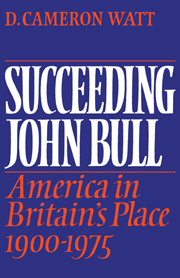8 - Some tentative conclusions
Published online by Cambridge University Press: 05 November 2011
Summary
It is difficult for any British historian contemplating the record of Anglo-American relations over the last eighty years to avoid one of two reactions: the more Atlanticist in sympathy, while taking pride in the undoubted achievements of British and American cooperation, will be left at the end with a feeling of failure and disappointment. The more nationalist in temperament and outlook will be left in a rage at the seductiveness of the myth of the special relationship and feel that American success was eased by British self-delusion. Others may be equally critical of the American obsession with British imperialism and capacity for persuading themselves that the economic success which accompanied their vision of the international society is consequential rather than coincidental. Sub specie aeternitatis (the only respectable viewpoint for the profession of historian), these reactions are interesting only because they provide the reader with map references to the location in time, space and culture of the historian. But the illusion of timelessness can be achieved by individual historians only at the cost either of part or all of their humanity or of their ability to pass on their thoughts to humanity. The expression of such views is both unavoidable – since who can discipline their reactions – and unprofitable to our understanding of the historical process. But some pointers towards a more balanced judgment of the processes sketched in the preceding essays should have emerged even from so rapid and uncertain a survey as this.
- Type
- Chapter
- Information
- Succeeding John BullAmerica in Britain's Place 1900-1975, pp. 158 - 164Publisher: Cambridge University PressPrint publication year: 1984

